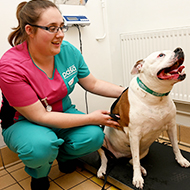
The vet charity is using National Obesity Awareness Week to highlight pet obesity.
Veterinary charity PDSA has launched a week-long campaign to mark National Obesity Awareness Week (10-16 January), encouraging pet owners to #WeighUp their pets and recognise and tackle any weight issues.
The charity has created a free downloadable resource to help pet owners recognise weight issues, featuring statistics on overweight pets, guidance on how to look and feel pets to determine body weight, and advice on treats, diet, exercise and body condition scoring.
PDSA's annual Animal Wellbeing (PAW) Report, discovered that over 1.4 million pets had gained weight since the beginning of the pandemic, with three in ten pet owners disagreeing that overweight pets are more likely to suffer from serious diseases, indicating a lack of understanding of the severity of the dangers of overweight pets.
Nina Downing, a veterinary nurse at PDSA, advises pet owners: “I’d encourage anyone who is concerned about their pet’s weight to take action now – the risks of carrying extra pounds are significant, however, making small changes to keep them at a healthy weight can make a huge difference.
“To help owners spot the signs of weight gain in their pets, we’ve created our handy #WeighUp guide, which makes it easy to review a pet’s shape and breaks down achievable steps to combat any weight-related issues.
“As we enter a new year, many of us will be turning our attention to how we can improve our own health and wellbeing – and we should pay our pets the same care.
“Long-term, the best thing you can do for your furry friend is to encourage healthy habits, helping them live an active and happy life.”
Images (C) PDSA



 The Veterinary Medicines Directorate (VMD) is inviting applications from veterinary students to attend a one-week extramural studies (EMS) placement in July 2026.
The Veterinary Medicines Directorate (VMD) is inviting applications from veterinary students to attend a one-week extramural studies (EMS) placement in July 2026.